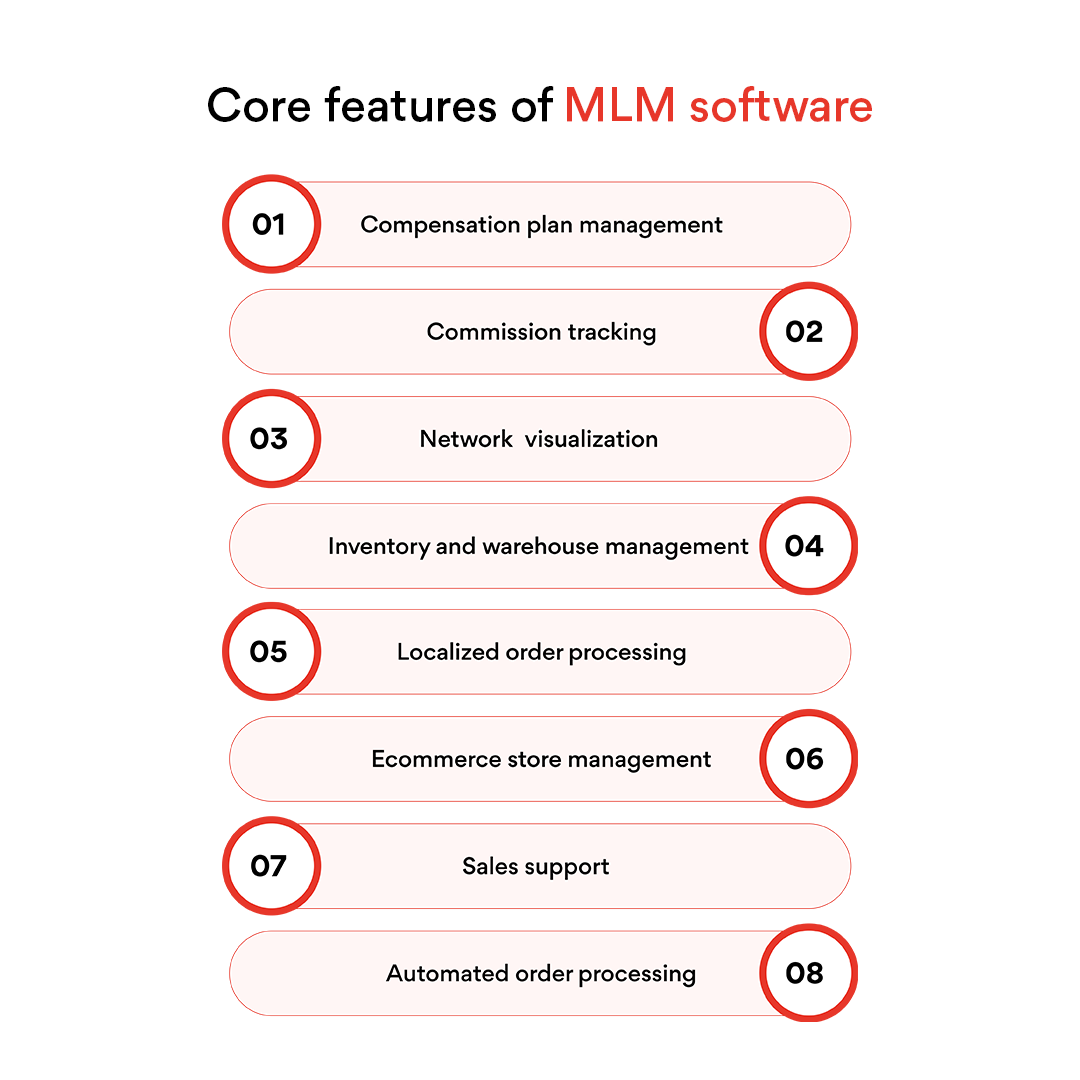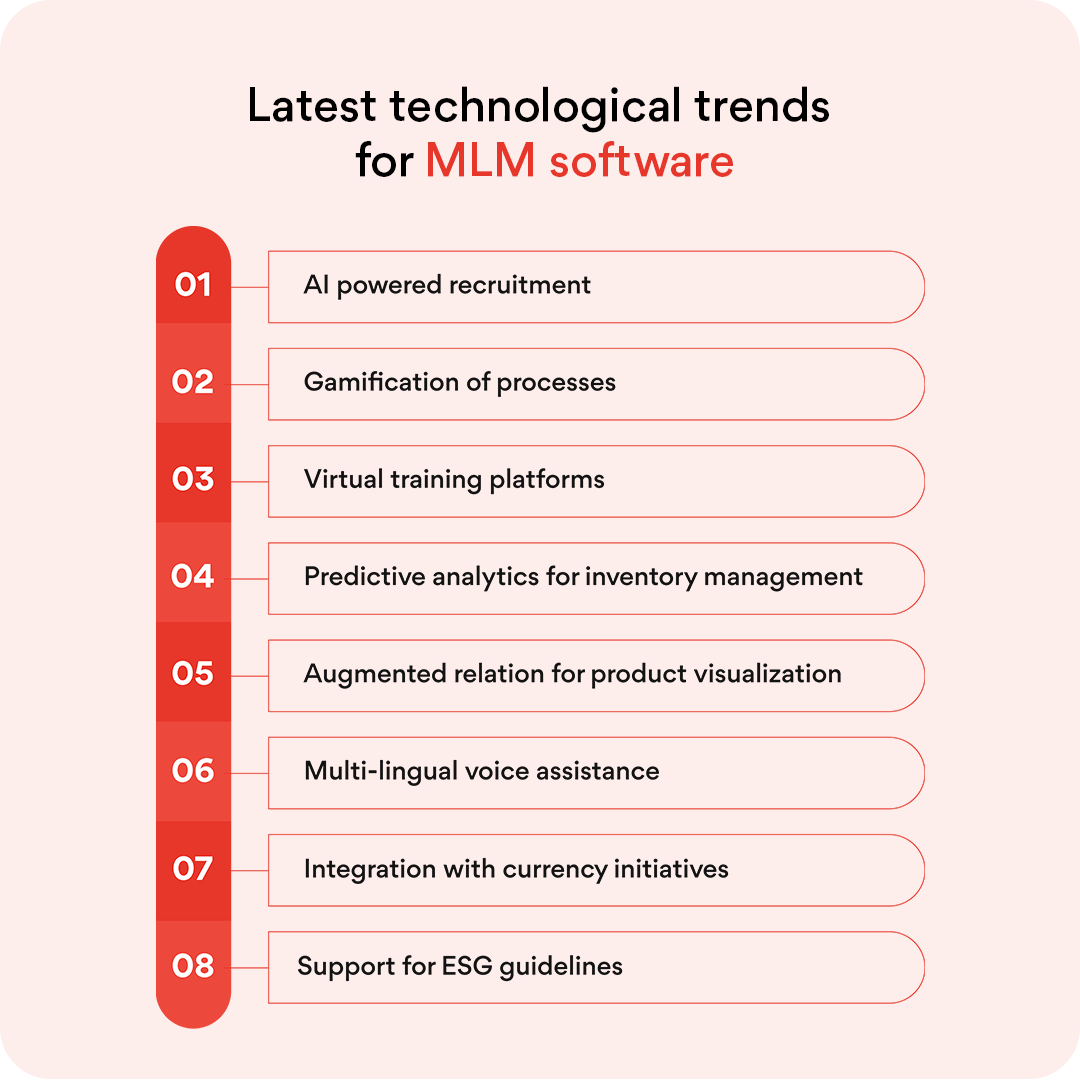MLM Software Buyer's Guide for Malaysian Entrepreneurs and Distributors

- Common features of MLM software
- Regulatory compliance features
- Essential features
- Advanced technological integrations
- Localization of MLM software
- Security and data protection
- Integrations for MLM businesses
- Mobile accessibility
- Cost considerations
- Features for cross-border businesses
- MLM software buyers’ checklist
- Emerging trends for MLM software
- Implementation of MLM software
The Malaysian direct selling market amounted for an impressive $8.6 billion in the year 2022 and is the sixth largest market globally—after Japan. It is a hub for MLM and direct selling enterprises and an open market for trade. That said, with a lot of direct selling companies setting camp in Malaysia, there are a lot of compliances—legal, financial, regulatory that they must adhere to.
The solution? MLM software, a specialized business management solution which is designed to manage the operational nitty-gritties of direct selling companies. Modules like compensation calculations, distributor network management, and inventory tracking help companies function efficiently.
Still new to the idea of MLM software? We got you! Here is a software guide for MLM businesses in Malaysia, that will give you a heads up on what to expect from your MLM software.
Common features of MLM software for the Malaysian direct selling market
With the Digital Economy Blueprint (MyDIGITAL) driving technological adoption across businesses, modern MLM platforms must align with national initiatives while meeting market-specific demands. Now, this may be overwhelming so some businesses, especially if you are new to the country. Implementing MLM software is the solution for keeping up with the market. Following is some of the functionalities that your MLM software offers:

1. Payment integration – Customers trust businesses that provide common payment outlets. You can opt for popular local payment gateways like FPX, Boost, Touch 'n Go, and GrabPay for fast and secure transactions.

2. Multi-language support – With a cosmopolitan population, the Malaysian population consists of a lot of ethnicities. To work with such a diverse population, you need a software with built-in support for local languages like: Bahasa Malaysia, English, Mandarin, Tamil, along with some indigenous languages.

3. Regulatory compliance – One of the national regulatory compliances for all businesses is to follow Malaysia’s Personal Data Protection Act (PDPA) 2010. This protects the consumers’ data and ensures secure and compliant data handling.

4. Ecommerce integrations – Expand sales channels by integrating with local online marketplaces like Shopee, Lazada, and PGMall.

6. Bumiputera & SME-friendly features – Support government-backed initiatives aimed at empowering Bumiputera entrepreneurs and SMEs within the MLM ecosystem.
Regulatory compliance features
The first thing to know about the Malaysian direct selling market is that it works in an economic and regulatory framework. This makes it essential for MLM software to follow the local compliances to the T.
The Ministry of Domestic Trade and Consumer Affairs of Malaysia (KPDNHEP) has set strict regulatory frameworks for businesses in the country. This makes it difficult to run an MLM company in Malaysia, since there are so many regulations to look out for, and non-compliance leads to big penalties and operational roadblocks. Here are some of the significant legal compliance features that you'll find in an MLM software:

Direct sales and Anti-Pyramid Scheme Act 1993 compliance – Built-in tools to ensure your MLM structure aligns with legal guidelines, preventing regulatory violations.

KPDNHEP license management – Automated tracking and reporting modules to streamline license applications and renewals.

GST/SST tax reporting – Integrated tax calculation features to ensure seamless Goods and Services Tax (GST) and Sales and Service Tax (SST) compliance.

Refund and cooling-off period management – Ministry-approved policies for consumer protection, ensuring proper refund handling.

Automated documentation – Instantly generate legally required disclosure documents to meet Malaysian regulations.

Commission caps and legal limits – Set automated commission restrictions to comply with MLM earnings regulations.

Annual Practicing Certificate (APC) tracking – Keep track of APC renewals to avoid business disruptions.

Halal certification monitoring – Manage and track Halal certifications for MLM products catering to Malaysia’s Muslim market.

Bumiputera ownership verification – Built-in tools to verify and report Bumiputera ownership status for regulatory compliance.
Build a thriving MLM business in Malaysia with software optimized for regulatory compliance, automation, and seamless distributor management.
Get Free DemoEssential features for MLM businesses
For Malaysian MLM entrepreneurs, choosing a platform tailored to local business operations—not just a generic global solution—is crucial for efficiency and scalability.
For MLM software to provide an enhanced distributor engagement, and compliance with local business practices here’s what your MLM business needs:

Flexible compensation plan engine – Support for various MLM structures like unilevel, binary, matrix, and hybrid plans, ensuring adaptability to different business models.

Real-time commission processing – Instant payout calculations with Ringgit-optimized currency handling, keeping earnings accurate and compliant.

Genealogy and network visualization – Advanced tools to map and manage distributor hierarchies for easy tracking of sales performance.

Inventory and warehouse management – Multi-location support to efficiently handle fulfillment centers across Malaysia.

Localized order processing – Seamless transactions with Malaysian address formatting and postal code validation.

Replicated websites and ecommerce stores – Distributor storefronts with Bahasa Malaysia and multilingual support to enhance customer reach.

Local credit and consignment sales support – Designed to accommodate Malaysia’s distribution models, ensuring smooth credit period management.

Auto-ship modules – Automated order processing aligned with Malaysian banking regulations, making recurring purchases hassle-free.

Advanced technology integration
Modern MLM software should incorporate cutting-edge technologies that align with Malaysia's digital transformation goals. These technological capabilities not only enhance operational efficiency but also provide competitive advantages in an increasingly tech-savvy marketplace.

AI-powered analytics – Leverage artificial intelligence for distributor performance predictions and retention strategies, helping businesses make data-driven decisions.

Blockchain-based transaction verification – Enhance transparency and trust in commission payouts and distributor transactions.

Cloud-based architecture – Ensure seamless access from anywhere in Malaysia, even in areas with varying internet connectivity.

Mobile-optimized apps – Designed to match Malaysian smartphone usage patterns, ensuring smooth user experiences.

Localized data analytics dashboards – Culturally relevant KPI visualization to track performance effectively.

Social media integration – Direct connectivity with popular Malaysian platforms for streamlined distributor marketing.

Edge computing for rural areas – Improved software performance for East Malaysian territories with lower network speeds.

Digital signature support – Compliant with the Malaysia Digital Signature Act 1997, ensuring legally valid e-signatures.
Localized user experience
A well-localized software interface can significantly improve adoption rates among Malaysian distributors. True localization goes beyond simple language translation—it involves cultural relevance, familiar workflows, and user-friendly design that align with local expectations.
Key elements to consider:

Culturally appropriate imagery and design – Visual elements that resonate with Malaysia’s diverse population.

Malaysian date and time formats – Ensure compatibility with the DD/MM/YYYY format commonly used in the country.

Public holiday – Built-in scheduling functions that account for Malaysian public holidays to avoid business disruptions.

Local address and postal code formatting – Proper validation to ensure smooth order processing.

Malaysian phone number formatting – Standardized input fields supporting local mobile carriers.

Familiar payment workflows – Mirror the user experience of popular Malaysian digital payment services for seamless transactions.

Islamic and Gregorian calendar support – Dual-calendar functionality to cater to Muslim distributors.

Culturally sensitive color schemes – Design choices that reflect Malaysia’s multicultural society.

East Malaysia-specific features – Custom adaptations for Sabah and Sarawak business practices.
A localized MLM software ensures a more intuitive user experience, better engagement, and higher distributor satisfaction, making it a must-have for businesses operating in Malaysia.
Security and data protection
To build customer loyalty, and trust, while adhering to legal compliances, MLM businesses have to prioritize consumer data protection. Implementing an MLM software has proven to be very helpful in this. It comes with integrated security measures that are tailored to combatting any cyber threats, while following all necessary regulatory compliances.

Compliance with Malaysian PDPA 2010 – Ensure data handling aligns with the Personal Data Protection Act to protect user privacy.

Local data hosting options – Store sensitive information within Malaysian territory for better data sovereignty and compliance.

Strong encryption standards – Secure critical data, including IC numbers, with advanced encryption protocols.

Multi-Factor Authentication (MFA) – Implement MFA support for Malaysian mobile numbers to enhance account security.

Regular security audits – Conduct frequent vulnerability assessments to identify and address potential threats.

Comprehensive backup and disaster recovery – Ensure data redundancy to prevent loss due to cyberattacks or system failures.

Compliance with Bank Negara Malaysia guidelines – Follow financial data security standards set by the country’s central bank.

Protection against regional cyber threats – Address Southeast Asia-specific cybersecurity risks, including phishing and malware attacks.
Integration capabilities
Running an MLM business consists of a lot of internal operations that require different software. Your MLM software should seamlessly connect with other business systems and services commonly used in Malaysia. This integration capability ensures data flows smoothly across your entire business ecosystem without manual intervention.
These features, when integrated with your MLM ecosystem, increase the efficiency of your business and reduce the requirement of manual work for tedious tasks and paperwork.

Malaysian accounting software: Compatibility with AutoCount, SQL Account, and UBS for automated financial management.

Local logistics providers: Direct connectivity with Pos Malaysia, J&T, Ninja Van, and GDex to simplify order fulfillment.

Payment gateway APIs – Support for iPay88, MOLPay, and Billplz to enable secure and convenient transactions.

CRM system integration – Smooth data exchange with Malaysian customer relationship management (CRM) software.

Messaging platform connectivity – Built-in integrations with WhatsApp Business and Telegram for real-time communication.

E-invoicing compliance – Compatibility with Malaysia’s e-Invoicing initiative under LHDN to meet tax regulations.

Banking platform connections – Automated distributor payments through local banking systems.
Mobile accessibility
People rely on mobile phones a lot for their daily work as well as for recreation. As an MLM business, your MLM software should facilitate mobile functionality to ensure that your distributors can efficiently manage their work on the go. This includes responsive design, native mobile apps for iOS and Android, and offline capabilities for areas with unstable internet, especially in East Malaysia. Features like mobile-optimized registration, QR code integration for events and product verification, and seamless mobile payment processing with local e-wallets enhance usability. Additionally, lightweight app versions cater to budget smartphones in rural regions, while support for regional mobile data packages ensures smooth performance across different connectivity conditions.
Cost considerations for Malaysian market
When evaluating MLM software pricing, businesses should focus on total value rather than just initial costs, ensuring alignment with Malaysian market conditions and business scales. The ideal pricing model should be transparent, scalable, and suitable for local revenue patterns without hidden fees. Factors like ROI calculations based on Malaysian conversion rates, exchange rate considerations for international providers, and comparisons with local competitors are crucial. Additionally, flexible payment terms should support Malaysian business cash flow, with special pricing options for startup MLMs under SME development programs.
Cross-border business features
Many Malaysian MLM companies operate across Southeast Asia. Planning to expand your business across borders? The software you choose should support regional expansion while maintaining compliance with each country's regulations.

Multi-currency support for regional operations (SGD, THB, IDR, PHP, etc.)

Cross-border inventory and warehouse management

Country-specific tax and regulatory compliance modules

Regional compensation plan variations

Support for ASEAN harmonized tariff codes

Regional language support beyond Malaysian languages

Compliance with cross-border data transfer regulations
MLM software buyers’ checklist
For Malaysian entrepreneurs and distributors, quality MLM software serves as the technological backbone that enables enterprise management and scaling while maintaining operational efficiency and compliance with local regulations.
Use this comprehensive 20-point checklist when evaluating MLM software options for your Malaysian direct selling business:

Compliance with Malaysian direct selling laws and regulations

Multi-language support including Bahasa Malaysia

Malaysian payment gateway integrations

Mobile app functionality optimized for local usage patterns

Cloud hosting options with servers in or near Malaysia

Customizable compensation plans supporting Malaysian market practices

Local tax calculation and reporting capabilities

Malaysian business hour technical support

Genealogy tools appropriate for typical Malaysian network structures

Integration with local logistics and delivery services

Social media features supporting platforms popular in Malaysia

Culturally appropriate user interface and design elements

Reliable uptime and performance metrics for Southeast Asian connectivity

Comprehensive data backup and recovery systems

Scalability to accommodate business growth in the Malaysian market

References from other Malaysian MLM companies using the software

Support for East Malaysian operations (Sabah and Sarawak)

Halal product tracking capabilities

Bumiputera business compliance features

Malaysian bank integration for distributor payments
Case studies and success stories
Read from our customers how we have been helping MLM organizations stay one step ahead of rising competition and customer expectations.
Stay ahead in Malaysia’s direct selling market with MLM software tailored for PDPA compliance, tax management, and local payment and logistics integrations.
Get Free DemoEmerging trends in MLM software
Before zeroing in on an MLM software, check whether it incorporates the latest features that are aligned with emerging industry trends and Malaysia's digital transformation roadmap. Some of the technological trends to look out for are:

AI-driven distributor recruitment and retention tools customized for Malaysian demographics

Gamification elements resonating with Malaysian cultural contexts

Enhanced virtual training platforms supporting interactive remote learning

Predictive analytics for inventory management based on Malaysian seasonal patterns

Augmented reality product visualization tools

Voice assistant capabilities supporting Malaysian English and Bahasa Malaysia

Contactless operations supporting post-pandemic business practices

Integration with Malaysia's upcoming Central Bank Digital Currency initiatives

Support for sustainability reporting in line with Bursa Malaysia's ESG guidelines

Implementation for MLM software in Malaysia
MLM software implementation in Malaysia requires careful planning and relationship-focused execution. A phased implementation aligned with local business cycles, smooth data migration, and culturally sensitive change management are key. Engaging distributor leaders early, running parallel systems during transition, and gathering local user feedback for optimization ensure seamless integration. Regular training refreshers, digital literacy considerations, and contingency plans for internet disruptions further enhance adoption. The right software should feel tailored for Malaysian businesses, not just adapted from global solutions.
